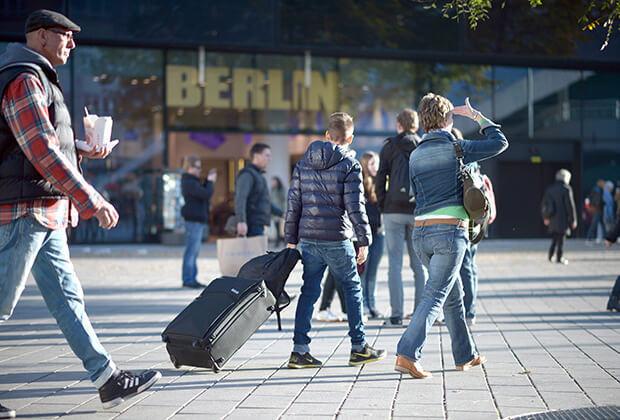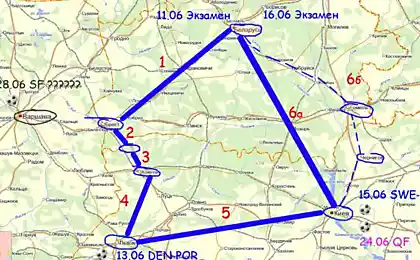531
How Germany changed my attitude to time
It was after moving to Germany, I realized that time really does not exist.
Standing at the bus stop, looking at the scoreboard — the bus will arrive in three minutes. To the station he usually goes six minutes. I need the train leaves in fifteen minutes. That is, if the bus arrives on time, I got six minutes to safely reach the platform and Board the train. And if the bus will arrive two minutes later, and then another two minutes will idle at traffic lights — I don't have time. Then I have twenty minutes at the station until the next train. What I can do then?

I can drink coffee. I'll be able to reply to emails. I will be able to view work programs. I can book a ticket to Berlin. To repeat German vocabulary, in the end. Twenty minutes is the same — hoo much! So even if I'm late, I still have to do.
Worse, when a scheduled meeting. Need trains are sometimes delayed or canceled altogether. Alternative options are there, but if you go back to back, you'll be late for a meeting from 10 to 20 minutes. Therefore, if the meeting is important, you sit down for one or two trains back to exactly to do. So there is an additional half hour at the arrival point. You can go to the bookstore, which was long planned to go, or again, to drink coffee, reply to emails, view program....
From the outside it all looks a bit funny. At first.
There are many Germans have such a characteristic, universally, be happy if it turned out correctly to plan the time and do everything.
I have watched as they are first excited to calculate these two or three minutes for something to catch, then with the tension waiting for — get all, and then rejoice when grown together. Previously, I was unclear. Well, late for the train, will quietly waiting for the other. Write that are delayed by fifteen minutes. The train goes thirteen minutes, sleep in there, finally. And then I noticed that the cars almost asleep one me. Yes.
No matter how much the trip lasted five minutes or forty-five, the local do something. Talking (on the phone too), knocking the notebook, proofread some documents (love most of the Germans to printed materials and documentation, they do not feed bread, give something to print and there pokerkat special markers). Often eat, and is at first annoyed me the most. It's a train: it's filthy, crumbs fall, it's immoral, even by.

And then it so happened that I had to use the German railway daily: at least twice a day to wander from one city to another. The distances are small (for example, from Wiesbaden to Frankfurt can be reached in 32 minutes), but if you constantly need to be late for the train, the whole day (no, all the next day too, and then the rest of the week) goes to hell. I checked.
Because the first year I was always late. My Eastern blood and years of life in a country where the scoreboard is written when the train was gone and not coming, and some bus simply can not stop (well, sometimes), did not allow me to accept the fact of existence of the application with schedule of public transport. But then I gave up. And the beginning (of God) plan. Often in minutes. After that I started to happen strange things.
With one hand I began to live better.
For example, visa application centre sends me the list of required documents to be updating for three months. Immediately in the letter specify the exact date, time and office where the documents I need to bring. Three months. The first time I decided to do everything in the last two weeks and began to ring up my desired instance, and they twisted a finger at a temple and said, "Sign up for a termin and come. The nearest available date in a month". And so all. All right, what is really there. Now I quietly from everywhere calling me asking about timing, and about a couple of weeks 90% of the documents I have ready (if something from the list I can't make it on time, not their fault, I take advance in the right court a certificate stating that I can't get the document. Definitely printed with "live" signature). Work is also sync: time much more than before, and increased volumes do not frighten, because on the trains I'm not sleeping (even if the food at 6.30, and it happens sometimes) and get a netbook. But there is another side.
I became very nervous if the bus is late for two minutes. A little bit nervous because I have a plan "B", Ho Ho. But it so happens that another bus then stands on all the lights, and again I lose 4-5 minutes and all my brilliant time management runs the risk to fail. But the bus is not in traffic lights, and I still have time. But that's not it. The fact that I was nervous if time goes not according to plan! I kind of got to catch more, but I became more nervous, if something went wrong. You know, what's the point?
Also interesting: 10 things you need to know about the French
What the Paris don't like Parisians themselves
There are two situations. You come to a bus stop in any country where the schedule of public transport is missing, and get nervous if the bus takes so long? And you come to a bus stop in any country where the schedule of public transport there, and get nervous if Busa long (i.e. several minutes) no.
I laughed for a long time.
Jump on the platforms of the station, boarded the train car and laughing.
Because it's not how much time we have.
The thing is, how we relate to it. published
Author: Tamriko Sjølie
Source: splash.project-splash.com/posts/kak-germaniya-izmenila-moe-otnoshenie-kovremeni-/gaidjfc8aeg
Standing at the bus stop, looking at the scoreboard — the bus will arrive in three minutes. To the station he usually goes six minutes. I need the train leaves in fifteen minutes. That is, if the bus arrives on time, I got six minutes to safely reach the platform and Board the train. And if the bus will arrive two minutes later, and then another two minutes will idle at traffic lights — I don't have time. Then I have twenty minutes at the station until the next train. What I can do then?

I can drink coffee. I'll be able to reply to emails. I will be able to view work programs. I can book a ticket to Berlin. To repeat German vocabulary, in the end. Twenty minutes is the same — hoo much! So even if I'm late, I still have to do.
Worse, when a scheduled meeting. Need trains are sometimes delayed or canceled altogether. Alternative options are there, but if you go back to back, you'll be late for a meeting from 10 to 20 minutes. Therefore, if the meeting is important, you sit down for one or two trains back to exactly to do. So there is an additional half hour at the arrival point. You can go to the bookstore, which was long planned to go, or again, to drink coffee, reply to emails, view program....
From the outside it all looks a bit funny. At first.
There are many Germans have such a characteristic, universally, be happy if it turned out correctly to plan the time and do everything.
I have watched as they are first excited to calculate these two or three minutes for something to catch, then with the tension waiting for — get all, and then rejoice when grown together. Previously, I was unclear. Well, late for the train, will quietly waiting for the other. Write that are delayed by fifteen minutes. The train goes thirteen minutes, sleep in there, finally. And then I noticed that the cars almost asleep one me. Yes.
No matter how much the trip lasted five minutes or forty-five, the local do something. Talking (on the phone too), knocking the notebook, proofread some documents (love most of the Germans to printed materials and documentation, they do not feed bread, give something to print and there pokerkat special markers). Often eat, and is at first annoyed me the most. It's a train: it's filthy, crumbs fall, it's immoral, even by.

And then it so happened that I had to use the German railway daily: at least twice a day to wander from one city to another. The distances are small (for example, from Wiesbaden to Frankfurt can be reached in 32 minutes), but if you constantly need to be late for the train, the whole day (no, all the next day too, and then the rest of the week) goes to hell. I checked.
Because the first year I was always late. My Eastern blood and years of life in a country where the scoreboard is written when the train was gone and not coming, and some bus simply can not stop (well, sometimes), did not allow me to accept the fact of existence of the application with schedule of public transport. But then I gave up. And the beginning (of God) plan. Often in minutes. After that I started to happen strange things.
With one hand I began to live better.
For example, visa application centre sends me the list of required documents to be updating for three months. Immediately in the letter specify the exact date, time and office where the documents I need to bring. Three months. The first time I decided to do everything in the last two weeks and began to ring up my desired instance, and they twisted a finger at a temple and said, "Sign up for a termin and come. The nearest available date in a month". And so all. All right, what is really there. Now I quietly from everywhere calling me asking about timing, and about a couple of weeks 90% of the documents I have ready (if something from the list I can't make it on time, not their fault, I take advance in the right court a certificate stating that I can't get the document. Definitely printed with "live" signature). Work is also sync: time much more than before, and increased volumes do not frighten, because on the trains I'm not sleeping (even if the food at 6.30, and it happens sometimes) and get a netbook. But there is another side.
I became very nervous if the bus is late for two minutes. A little bit nervous because I have a plan "B", Ho Ho. But it so happens that another bus then stands on all the lights, and again I lose 4-5 minutes and all my brilliant time management runs the risk to fail. But the bus is not in traffic lights, and I still have time. But that's not it. The fact that I was nervous if time goes not according to plan! I kind of got to catch more, but I became more nervous, if something went wrong. You know, what's the point?
Also interesting: 10 things you need to know about the French
What the Paris don't like Parisians themselves
There are two situations. You come to a bus stop in any country where the schedule of public transport is missing, and get nervous if the bus takes so long? And you come to a bus stop in any country where the schedule of public transport there, and get nervous if Busa long (i.e. several minutes) no.
I laughed for a long time.
Jump on the platforms of the station, boarded the train car and laughing.
Because it's not how much time we have.
The thing is, how we relate to it. published
Author: Tamriko Sjølie
Source: splash.project-splash.com/posts/kak-germaniya-izmenila-moe-otnoshenie-kovremeni-/gaidjfc8aeg























